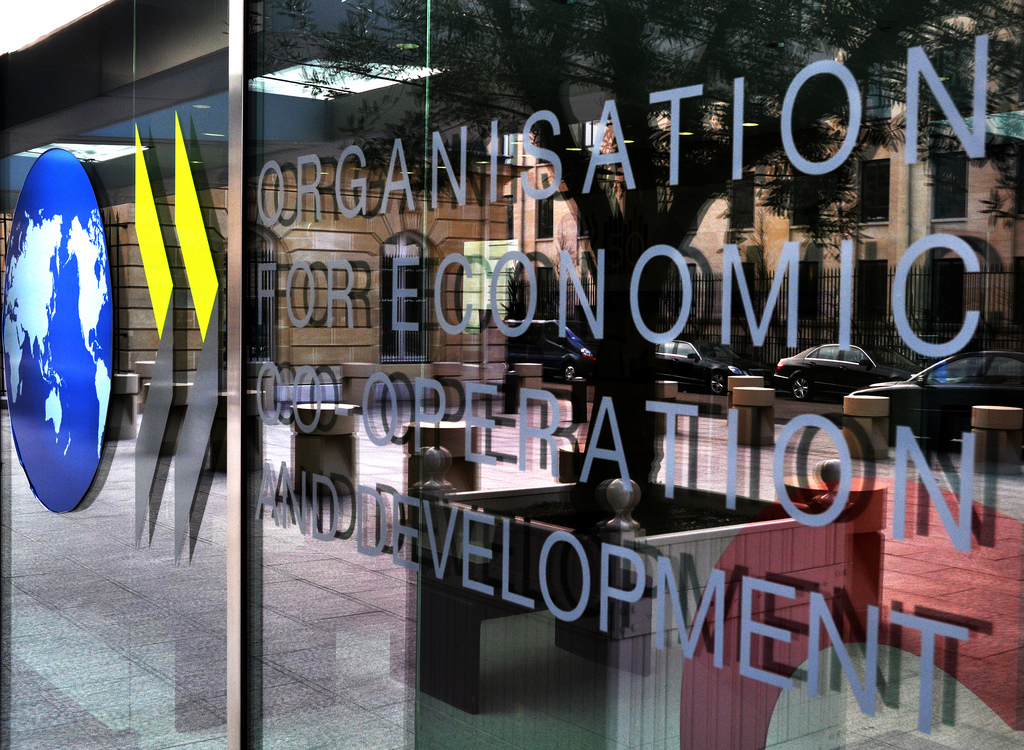Is Global Tax Diplomacy Paying Off?
 Source: OECD/Michael Dean
https://www.flickr.com/photos/oecd/5887933760
Source: OECD/Michael Dean
https://www.flickr.com/photos/oecd/5887933760
The words ‘International regulatory tax framework harmonisation’ are unlikely to spark the interest of most readers – and writers – at first sight. Few enjoy exploring the patchwork of international tax arrangements, when filling out tax returns alone can leave them questioning the sanity of the bureaucracies that created them. Even worse are agreements coated in layers of jargon so thick that you’d need a tax lawyer with a pickaxe to decipher them. Therefore it is not surprising that their importance to the global economy is difficult to quantify. Part of this comes from the lack of information on how much multinational companies are paying in taxes to various countries and how tax arrangements can change their behaviour. Last month, an agreement was signed by 31 countries on tax information sharing, which should go some way to alleviating the first issue of information by pushing companies to report their earnings and tax payments in-country. When it comes to the question of what’s the significance of the agreement, the answer comes in three parts: cooperation can reduce zero-sum competition among countries to attract MNCs through low taxes, companies are taxed more equitably when it is not only the largest that can avoid taxes overseas, and estimates put global corporate tax revenue losses at 4-10% of the total revenue to the tune of 100-240 billion$ per year – that’s larger than the GDP of 145 countries.

Google’s 190-million-dollar settlement with UK tax authorities grabbed headlines earlier this year after it paid only 30 million dollars in tax on 5.5 billion dollars of revenue in 2013. This case highlighted the complex tax arrangements that multinational companies use to pay what can be close to zero percent corporate tax. Google was using an infamous provision in Irish and Dutch tax laws dubbed the ‘double Irish with a dutch sandwich’. Tax avoidance schemes like this can be found throughout the EU. In January the EU passed an “Anti Tax Avoidance Package” that was designed to “hamper aggressive tax planning, boost transparency between Member States and ensure fairer competition for all businesses”. Its measures included provisions for taxing in-country profits even if transferred offshore, reporting financial results in all countries, and capping the tax deductible from interest. The European parliament highlighted that corporate tax avoidance in the EU alone at 50 to 70 billion euros is equivalent to Bulgaria’s GDP. The process of coordinating tax arrangements within the EU has revealed two key issues. First, the sheer scale of tax avoidance, it is enormous not only in absolute numbers but also in the near zero corporate tax paid by many as was shown by Luxleaks; over 300 multinationals pay tax rates as low as 1% in secret deals with countries like Luxembourg. (awkward sentence) Second, the protracted progress of negotiations because of the ‘Tax havens’ interests like Luxembourg provides an indication for how much more difficult coordinating global tax regulation will be outside of a regional political union.

Perhaps one of the best explanations of international tax policy and the watered down agreement that has followed years of negotiations is the prisoner’s dilemma. A favourite among political scientists, this model explains why countries are unlikely to raise taxes on companies that use them as tax havens. While the countries would benefit from international cooperation for relatively equitable corporate taxation, the incentive for cooperation is weak when they fear that another country will defect by giving companies a loophole and low taxes. For a small city like Lausanne Switzerland however, there is a clear incentive and it has little to gain from setting internationally comparable taxation levels; instead it collects taxes at a lower tax rate that attracts companies that would not come without them. Lausanne makes secret agreements on the tax rate of multinationals and keeps taxes low for fear of other cities tempting mobile multinationals from relocating to lower tax environments – much like countries do internationally. As a civil society group advocating global tax reform explained, international corporate taxation often is “a race to the bottom”. Tax planning is a major component of any investment or relocation decision for almost any multinational, countries looking for investment know this and it shows in the dozens of commercials on the BBC World Service advertising low corporate taxes.

The OECD facilitated agreement is founded on “Base Erosion and Profit Shifting” proposals that call for multinationals to report earnings and taxes paid in-country under transparency measures – however this information is not public. Much like tax havens’ reluctance in the EU and the prisoner’s dilemma, countries resist proposals that they feel might endanger their companies’ business. The dilute nature of the agreement was largely the result of disproportionately powerful US protection of its large technology multinationals like Apple and Google. Lee Sheppard, a tax lawyer observed: “It’s as if BEPS was being killed off from the inside by letting Americans loose on it.” Nevertheless, the agreement does provide for the first step necessary for cooperation – information sharing.
Analysing international tax arrangements with the prisoner’s dilemma provides a convincing narrative but like any model misses factors affecting their behaviour external to the model. Companies ranging from Amazon to private banks have recognized the potential public relations fall-out of tax avoidance and have adjusted to more transparent tax structures, contradicting the rationale behind minimizing taxes. The current patchwork and many of the expansions on it were built for international manufacturing rather than the knowledge and intellectual property driven modern world economy. The BEPS agreement was signed by economically developed countries with sophisticated tax systems while developing countries who have lost tax revenues estimated to be equivalent to 1.75% of GDP were largely excluded from the negotiations. It is hard to measure the impact of these revenue losses, but the bottom line is that these revenues can make a life-saving differences in public services to hundreds of millions of people. Multinationals are often the most reliable source of tax revenue for developing countries, and expanding international tax cooperation is comparable to aid transfers in financing public services. The BEPS agreement facilitated by the rich country OECD is limited in its effectiveness and reach, but crucially it represents a step forward; global tax policy, like politics is the art of the possible.
